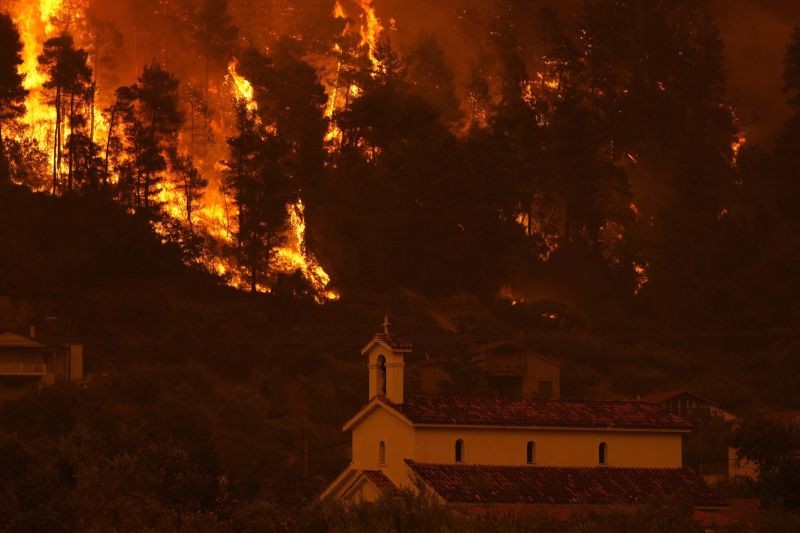Flames approaching at Gouves village on the island of Evia, about 185 kilometers (115 miles) north of Athens, Greece on August 8, 2021. Pillars of billowing smoke and ash are blocking out the sun above Greece's second-largest island as a days-old wildfire devours pristine forests and triggers more evacuation alerts. (AP/PTI Photo)

GOUVES(Greece), August 8 (AP): Pillars of billowing smoke and ash blocked out the sun above Greece’s second-largest island and turned the sky orange as a days-old wildfire devoured pristine forests and triggered more evacuation alerts Sunday, while residents appealed for additional firefighting help.
The fire on Evia, an island of forested mountains and canyons laced with small coves of crystalline water, began Aug. 3 and cut across the popular summer destination from coast to coast, burning out of control for five days. Scores of homes and businesses have been destroyed, and thousands of residents and vacationers have been evacuated.
The blaze currently is the most severe of dozens that broke out in Greece in the wake of the country’s most protracted and intense heat wave in three decades, which sent temperatures soaring to 45 degrees Celsius (113 F) and created bone-dry conditions.
The Greek coast guard said three patrol boats, four navy vessels, one ferry, two tourist boats and numerous fishing and private boats were on standby to carry out more potential evacuations from the seaside village of Pefki, on Evia’s northern tip.
Around 350 people already boarded the ferry, the coast guard said, while towering flames cut off many escape routes by roads. Evacuation orders were issued for four villages, including Pefki, but some residents refused to leave, hoping to save their properties.
Planes and helicopters dropped water on the flames from above.
Three more major fires were also burning Sunday in Greece’s southern Peloponnese region, while a massive fire that ravaged forests, homes and businesses on the northern fringes of the Greek capital appeared to be on the wane. That fire burnt through large tracts of a national park on Mount Parnitha, the largest forested area remaining near Athens that still bore deep scars from a fire in 2007.
The causes of the fires are under investigation. Three people were arrested Friday — in the greater Athens area, central and southern Greece — on suspicion of starting blazes, in two cases intentionally.
Ten countries have already sent personnel and firefighters equipment such as aircraft to Greece, while another eight are sending further reinforcements.
Greek Prime Minister Kyriakos Mitsotakis visited the fire department’s headquarters in Athens Saturday and expressed his “deep sadness” for the volunteer firefighter’s death. He later visited the airport from which firefighting planes take off and thanked the pilots, both Greek and French.
Securing aid for everyone affected by the wildfires will be “my first political priority,” the prime minister said, promising that all burnt areas would be reforested.
Greek and European officials have blamed climate change for the large number of fires that burned through southern Europe in recent days, from Italy to the Balkans, Greece and Turkey.
Massive fires also have been burning across Siberia in northern Russia for weeks, forcing the evacuation Saturday of a dozen villages. In all, wildfires have burned nearly 15 million acres this year in Russia.
In the US, hot, dry, gusty weather has also fueled devastating wildfires in California.






